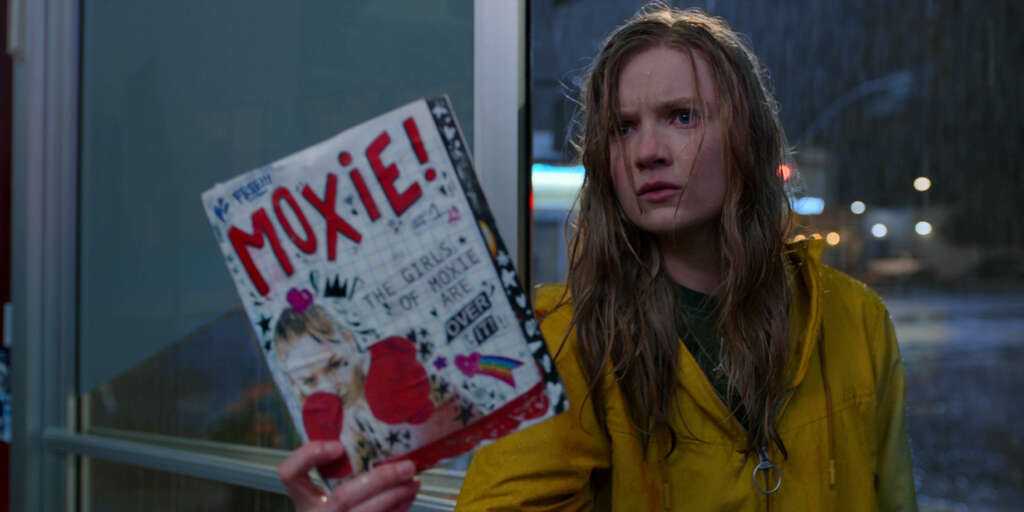Amy Poehler, the actor and comedian behind everyone’s favourite inspirational feminist sitcom character, returns to directorial duties with Moxie. Based on the 2017 YA novel of the same name by Jennifer Mathieu, her sophomore outing excitingly hits streaming service Netflix this week. The coming-of-age Gen Z dramedy refreshingly focuses on female friendships, willing for hopeful change in high school.
Witnessing the harassment of confident new arrival Lucy (Alycia Pascual-Pena) forces introverted Vivian (Hadley Robinson) to acknowledge the unchecked sexist behaviour of her fellow high-school classmates. After discovering her mum’s (Amy Poehler) rebellious ‘Riot grrrl’ punk past, she’s inspired to write and publish a zine which pushes back at the guy’s demeaning annual rankings of Rockport High’s female students. The tradition of judging and objectifying students by “Best Ass” and “Most Bangable” is the norm at the school, merely dismissed as boyish behaviour by the enabling Principle Shelly (Marcia Gay Harden). The zine quickly gains new popularity, forging new allies between the many friendship groups of young women, sparking a school-wide feminist uprising.
It’s hard to fault Moxie‘s well meaning and good-natured outlook, with it’s central message reinforcing the importance of standing up for yourself and what’s right. While the film only begins to scratch the surface of feminism and personal empowerment, it’s a positive and often fun introduction to the movement with the earnest aim of sparking a wider debate amongst the younger audience. Yes it often falls into generic high-school tropes, particularly as a number of the extended ensemble are placed in typical cliques due to the runtime (and certain actors definitely looking older than their respective roles). However the inspiring feeling of unity and powerful friendships which transcend social groups is endearing.
Utopia’s Robinson leads a charming and talented young cast, with the central friendship of Claudia (Lauren Tsai) and Vivian proving a loveable base. Robinson also shares a wonderful relationship with Poehler’s Lisa, who supports her exploration of the movement, but also admits the failings of the 90s rebellion when it came to intersectionality. Alycia Pascual-Peña pretty much steals every scene she’s in though, particularly in a fun thrift trip scene with Vivian. The dynamics of the high school are also hugely relatable; everyone’s experienced idiot jocks like Schwarzenegger and Joshua Walker’s characters, with teachers like Ike Barinholtz’s Mr Davies merely ignoring and enabling their behaviour.
Moxie represents and amplifies a number of different voices and perspectives whilst equally acknowledging Vivian’s relative position of privilege, particularly through the eyes of Claudia, who always has the sacrifices of her immigrant parents at the back of her mind. As alluded to earlier though, the main issue is the fact that while Poehler does address concerns of a woman who uses a wheelchair (Emily Hopper), a trans woman (Josie Totah) and women of colour, there isn’t enough time to really connect and learn about these character. In one scene there’s a kiss between two women which unfortunately feels rushed and dropped in to merely tick boxes.
The punk music which inspires Vivian to begin the zine Moxie, particularly from Kathleen Hanna of ‘Bikini Kill’, injects a riot of fun and rebellion into the film. The musical performance from the all female band Linda Linda is another highlight, especially as all pre-existing cliques disappear and the young women unite to rock out to the band.
Verdict
Idealistic and endearing, Moxie is a fun and well-meaning introduction to the feminist movement, with the talented young cast elevating the deep female friendships. While overly long, this is an enjoyable teen drama which I wish I could have watched when I was in secondary school.




